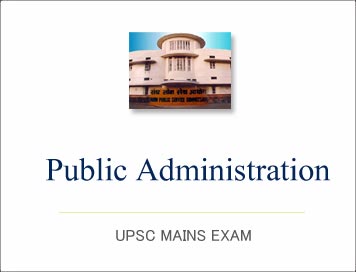Public Administration Papers Topic : Financial Administration

Public Administration Papers Topic : Financial Administration
- An administrator uses the budget as a framework for communication and co -ordination, as well as for exercising administrative discipline throughout the administrative structure. Explain. (20 marks 2011)
- 'Budget is a series of goals with price-tags attached.' Explain.. (20 marks 2011)
- Distinguish between PBBS and performance budgeting. (20 marks 2010)
- What is performance budgeting ? Bring out its merits, limitations and difficulties. (60 marks 2007)
- "Successfully Implementing budgeting approach requires favourable incentive structures." Discuss. (20 marks 2006)
- Why does the issue of budgeting as politics versus budgeting as analysis remain important in the budgeting process ? Do you agree that some synthesis of the two positions seems possible? Illustrate. (60 marks 2005)
- "The budget is an instrument of coordination." Explain. (20 marks 2005)
- Whereas ‘value for money’ audit aims at economy and ‘performance’ audit goes beyond both, to examine the effectiveness of a programme or activity. Examine this statement with suitable illustrations. (30 marks 2011)
- “Audit continues to be considered as something alien, something extraneous and something of the nature of an impediment.” Explain. (20 marks 2006)
- 'Those who budget, deal with their overwhelming burdens by adopting heuristic aids to calculation' (Wildavsky]. Explain. (15 marks 2012)
- "Good economics and bad politics cannot coexist in a sound budgetary process." Discuss this statement in the context of the developmental challenges in countries experiencing competitive politics. (60 marks 2008)
- What new models of budgetary capacity and incapacity have emerged after the decline of planning programming budgeting and zero based budgeting? (10 marks 2013)
- Budget allocations involve a series of tensions between actors with different backgrounds, orientations and interests and between the short term goals and long term institutional requirements. Discuss. (15 marks 2013)
- “Instead of reforms to budgetary process, W ildavsky process to redefine the role of political institutional and rules by which politics leads to agreement on budget.” Explain. (10 marks 2014)
- “The fact that we call something performance auditing means that we imply salient features which can distinguish it from other forms of inquiry.” Discuss with reference to the main measures or indicators of performance measurement. (20 marks 2014)
- Identify the main elements of Program Budgeting, Output Budgeting and New’ Performance Budgeting. What do they have in common with PPBS? (20 marks 2014)
- “No significant change can be made in the budgetary process without affecting the political process.” (Wildavsky). Analyse. (10 marks 2015)
- “Public Borrowing produces different effects on the economy.” Examine. (10 marks 2016)
- “Fiscal policy and monetary policy are the two tools used by the state to achieve its macroeconomic objectives.” Examine the statement and point out the differences between the tools. (20 marks 2016)
- “The key to understanding performance-based budgeting lies beneath the word ‘result’ ”. In the light of the statement, examine the elements of performance-based budgeting. (20 marks 2016)
- “Budgeting is apolitical process” – (Aaron Wildavsky) (10 marks 2017)
- “There can be no performance auditing without performance budgeting “(15 marks 2017)
- "Sound Performance Auditing is impossible without systematic Performance or Outcome Budgeting." Explain the relationship between the two. (15 marks 2018)
- “Monetary policy of a country can help or hinder its development process." Discuss. (15 marks 2018)
- Performance measurement remains an emerging issue but it is relegated to exclusively monitor and assess the use of funds. In light of the statement discuss various non-financial parameters of performance measurement to evaluate public sector organization. (20 Marks, 2019)
- Discuss the major areas of change in the Tax-Reforms of the post liberalization era. How do you justify the importance of the direct Tax reforms in this context? (15 Marks, 2019)
- Is William Niskanen’s “Budget Maximising Model” relevant today? Argue. (15 Marks, 2019)
- "Objectives of performance budgeting include improving expenditure prioritization, effectiveness and efficiency." Has performance budgeting worked effectively in governmental system ? Argue (20 Marks, 2020)

